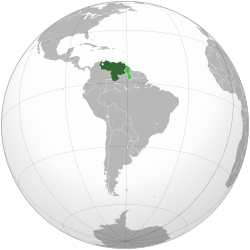Fourth Republic of Venezuela
| Republic of Venezuela | ||||||||||
| República de Venezuela | ||||||||||
|
||||||||||
|
Motto "Dios y Federación» |
||||||||||
|
Anthem Gloria al Bravo Pueblo |
||||||||||
| Capital | Caracas | |||||||||
| Languages | Spanish | |||||||||
| Religion | Catholic (around 92%) | |||||||||
| Government | Federal republic | |||||||||
| President | ||||||||||
| • | 1959–1964 | Rómulo Betancourt | ||||||||
| • | 1994–1999 | Rafael Caldera | ||||||||
| Legislature | Congress of Venezuela | |||||||||
| History | ||||||||||
| • | Established | 1958 | ||||||||
| • | Constitution adopted | January 16, 1961 | ||||||||
| • | Bolivarian Republic of Venezuela established | December 15, 1999 | ||||||||
| Currency | Bolívar | |||||||||
|
||||||||||
The Fourth Republic of Venezuela was the period of Venezuela's history that began with the fall of the dictatorship of General Marcos Pérez Jiménez and ended with the 1999 Constituent Assembly and the establishment of the present-day Bolivarian Republic of Venezuela, or Fifth Republic.
The Fourth Republic was characterised by the alternation of political power established in the Punto Fijo Pact; by the nationalisation of the oil industry in 1976 and the creation of PDVSA, the national oil and gas company; and by the rise of new social elites. Internationally, Venezuela became a founding member of the Organization of the Petroleum Exporting Countries (OPEC).
The 1980s in particular were characterised by the flowering of art and culture and by the artistic development of the nation, especially in television. Pioneering media like RCTV made Venezuela famous with soap operas such as Kassandra.
After a military coup d'état on 23 January 1958 sent General Marcos Pérez Jiménez into exile, Venezuela's three main political parties signed the Punto Fijo Pact. The ensuing elections brought Rómulo Betancourt, who had been president from 1945 to 1948, back to power. Betancourt's government halted grants to multinational oil companies, created a Venezuelan oil corporation, and helped establish OPEC in 1960, an initiative led by Development Minister Juan Pablo Pérez Alfonso. The administration also introduced a new constitution in 1961, dividing the government into executive, legislative, and judicial branches; pursued agricultural reform; and promoted an international doctrine in which Venezuela only recognised governments elected by popular vote.
The new order had its opponents. On 24 June 1960, Betancourt was wounded in an assassination attempt led by the Dominican dictator Rafael Leónidas Trujillo. Around the same time, the left-wingers excluded from the Punto Fijo Pact began an armed insurrection that was backed by the Communist Party of Cuba and its leader, Fidel Castro.
...
Wikipedia



